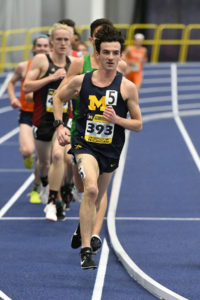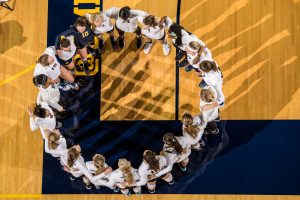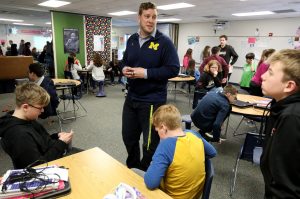 Athletes Connected continues its resource stories for student-athlete coping during the COVID-19 pandemic. This story is about learning strategies.
Athletes Connected continues its resource stories for student-athlete coping during the COVID-19 pandemic. This story is about learning strategies.
By Nick Velissaris, Ph.D., Athletic Counseling Team Clinical Neuropsychologist
Over the past few weeks, our lives have shifted in ways we could never have expected. Below we are going to address positive ways to create and maintain an effective learning environment.
Create a Learning Environment
This is a time in which we have generally adapted to our basic needs, but might still be struggling with the expectations of academic performance in this novel situation. We are creatures of habit and pull towards our comfort zone, especially in stressful situations.
In a lot of cases, the changes to online education and isolation do not allow for our preferred study routine. There is no longer required study table time, a spacious desk over at the Academic Center (AC), learning specialists on call, a quiet study environment, discussions, labs, applied learning modalities, etc.
Breaking up study time with breaks not only makes it easier to refocus attention, but it also increases efficiency in learning. Break options can be limited in isolation, but are still needed.
In most cases, study table time becomes when my family goes to sleep, the desk at the AC becomes a table or bed, and the quiet study environment becomes an annoying little brother. So what can we do?
The goal for a new study plan is to keep as many successful aspects of your old study plan as you can, and minimize the aspects that have been most negatively impacted by the situation.
In most cases, you will not be able to directly substitute something in your new plan to replace something from your old plan, so this will be a compromise. Our goal is to make that compromise as small as possible. For example, “Well, I don’t have a desk to study at like the AC, I guess I will just have to study lying in bed watching TV” is not a small compromise.
 Instead, set a time when you can clear a kitchen table, turn off the TV, and have your new study spot feel similar to the desk at the AC. The further away from an ideal study environment you get, the longer it will take you to learn the same information. The longer you are trying to learn and study, the more difficult it becomes to stay motivated.
Instead, set a time when you can clear a kitchen table, turn off the TV, and have your new study spot feel similar to the desk at the AC. The further away from an ideal study environment you get, the longer it will take you to learn the same information. The longer you are trying to learn and study, the more difficult it becomes to stay motivated.
The first step to adjusting your new study environment is to evaluate yourself. How do you learn best? What interferes with your optimal learning style in this new study environment? When you can’t get motivated, what made you motivated before isolation? What are your biggest distractions? Do you prefer reviews or a study group with others?
Asking yourself these questions can help identify your ideal study plan to adapt to your new isolation situation. Try to keep as much consistency as possible. Here are a few basic examples of compromises that can remain effective learning strategies:
HOME OFFICEOne major change is that you will likely be studying in your home. Create a temporary study area or area you can transform into a good study environment. It can be a specific timeframe where the kitchen table is unoccupied, turning a room into a study room, or making a dedicated study area in the corner of a low traffic room. Do not let this study area overlap with leisure or sleeping if possible.
SCHEDULE
If you had study table or a specific time when you used to study, continue that schedule. If you can’t continue the same schedule, create a routine where you can have the same study time blocked off each day of the week.
STUDY BREAKS
Breaking up study time with breaks not only makes it easier to refocus attention, but it also increases efficiency in learning. Break options can be limited in isolation, but are still needed.
Breaks should include a change of scenery (e.g., leave your study area and walk outside for ten minutes, get off the computer you use to study and do something else, etc.) and take a real break. Sitting in the same spot looking at your phone is not different enough from studying from a computer to give your brain an attention break.
NOTES/READINGS
Take notes the same way you did before with normal classes. If you handwrite your notes in a normal lecture, then hand write them with online lectures too. If you usually print readings or print your lecture slides, print them out now for the online lectures and studying as well if you are able.
DISTRACTIONS
Find a quiet place to study without many social interactions. This also applies to areas of your residence that have distractions. Do not study in the living room while your family watches TV. If you must, then download a white noise app and use headphones when studying.
PHONE
Use of social media, text, online communication will all drastically increase during isolation. With this increase, comes a higher attraction to distraction. When studying, mute notifications on apps that distract you and save them for dedicated study breaks.
GROUP STUDY
If you had study groups before, reach out to people in your class and set up a regular study group time using video chat apps.
MENTAL HEALTH
Anxiety and stress impacts our ability to learn information. If you are highly stressed or feeling overwhelmed, try relaxation exercises, yoga, or working out before studying. If you meet with an Athletic Counselor regularly, maybe schedule your study time for after your session to improve motivation.
Contact your mental health provider or reach out to the Athletic Counseling Team if you feel this change is beginning to be more of an issue than expected. Do not wait until you are struggling, because a lot of times it just takes a brief chat or support to get us back feeling how we’d like to be.
There may be slight differences in study planning if you have ADHD, a learning disability, or anxiety. Please follow the recommendations listed in your education plan, neuropsychological evaluation, or mental health documentation.
Use Repetitive Learning
Once you have a good study environment and good study plan in place… repetitions, repetitions, repetitions. Just like tying your shoes, learning a new athletic skill, playing an instrument, or navigating a new city, the most effective way to learn information for an exam is with multiple repetitions.
 Your brain stores information at a certain rate. The ability to remember that information accurately is greatly increased each additional time you attempt to learn it. The more you repeat the information you are studying, the better you will be able to store and remember it for the exam.
Your brain stores information at a certain rate. The ability to remember that information accurately is greatly increased each additional time you attempt to learn it. The more you repeat the information you are studying, the better you will be able to store and remember it for the exam.
Although just a brief example and not an exact comparison to studying, you can do a quick test to see this benefit. Do a memory test where someone says 20 words and then repeat back to them as many as you can remember. How many did you get? Do it again. How many did you get this time? If this were a typical test in school with 20 questions, each additional word would be a 5% increase in your score.
Think of the words as representing lecture slides, notes, text chapters, etc. The increase in your memory test can show you how much you improve with one extra repetition in your studying the material on the exam. Flashcards or apps like Anki are a perfect way to easily increase your repetitions.
Know that you are not alone in your struggles. If you need additional help creating or adjusting to your new learning plan, reach out to your Academic Advisor, the Academic Success Program (ASP)* staff, and/or the Athletic Counseling Team.
*for student-athletes not at Michigan, reach out to your school’s version of ASP, or your school’s Academic Support or Student Support Services units for assistance with learning strategies.
Additional Resources
- Athletes Connected Get Support Page
- Athletes Connected Featured Videos and Coping Skills Videos
- University of Michigan COVID-19 Update
- Michigan Medicine Disease Alerts
- Flattening the Curve for COVID-19: What Does it Mean and How Can You Help?
 About the Author
About the Author
Nick Velissaris, Ph.D., is a clinical neuropsychologist and athletic counselor with the University of Michigan Athletic Counseling Team. He has been at the University of Michigan since March 2019 and specializes in assessing and improving the cognitive, emotional, and behavioral functioning of our athletes. He holds two master’s degrees (clinical-behavioral psychology, clinical psychology) and a Ph.D. in clinical psychology with specialization in neuropsychology. Dr. Velissaris is a Michigan graduate and was a varsity letterwinner in wrestling.


 Athletes Connected is compiling a set of resources for student-athletes for coping during the COVID-19 pandemic. This story is about adjusting to isolation with some helpful positive self-talk when you’re feeling anxious or overwhelmed.
Athletes Connected is compiling a set of resources for student-athletes for coping during the COVID-19 pandemic. This story is about adjusting to isolation with some helpful positive self-talk when you’re feeling anxious or overwhelmed. 

 Keep a Routine
Keep a Routine Ply Your Trade
Ply Your Trade About the Author
About the Author


